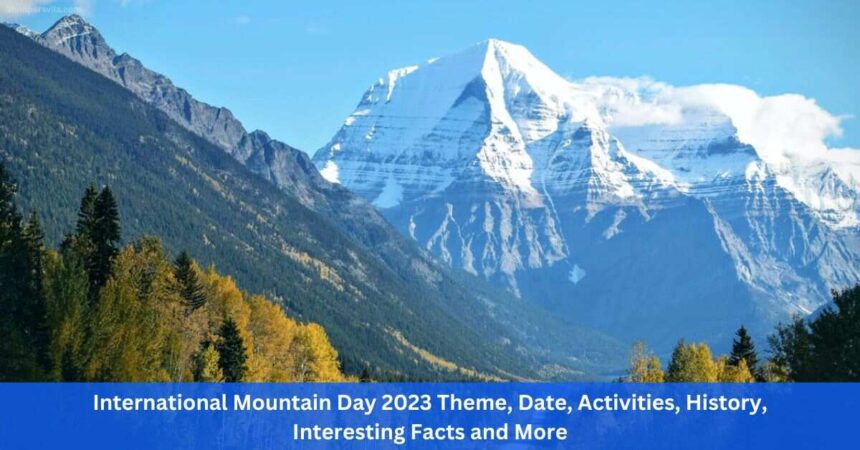International Mountain Day is an annual United Nations observance held on 11 December to build awareness about the importance of mountains, issues affecting them, and opportunities for sustainable development in mountainous regions worldwide. Read on to learn all about International Mountain Day 2023, from its history and significance to events, themes, and ways to get involved in celebrating mountains.
When is International Mountain Day Celebrated?
International Mountain Day is observed every year on December 11.
The date was designated by the UN General Assembly in 2003 after the UN declared 2002 the International Year of Mountains. The first International Mountain Day was celebrated in 2003.
December 11 was likely chosen because it did not conflict with other established UN observances. Having a set date annually allows for consistent messaging and global coordination of events.
What is the Significance of Mountains Globally?
Mountains have tremendous environmental, economic, and cultural importance worldwide:
- Mountains are biodiversity hotspots, home to nearly half of the world’s biodiversity hotspots and about a quarter of key biodiversity areas. They host a wide range of unique plant and animal species.
- Mountains provide freshwater resources to half the world’s population. They capture and store water from precipitation and snowmelt, acting as natural reservoirs.
- Many major rivers originate in mountain ranges, supplying water for drinking, irrigation, and hydropower. Mountain water supports food production and development far from the source.
- Mountains contribute significantly to human livelihoods and wellbeing. Nearly 1 billion people live in mountain areas, where they develop unique cultures, traditions, and knowledge adapted to mountain environments over centuries.
- Mountains offer a multitude of ecosystem services, from erosion control and nutrient cycling to recreation. They provide timber, minerals, and areas for spiritual renewal and artistic inspiration.
However, climate change, deforestation, overexploitation, pollution and more threaten the health and biodiversity of mountain ecosystems. Sustainable development in mountains is essential.
What is the Theme for International Mountain Day 2023?
The theme for International Mountain Day 2023 is “Women Move Mountains.”
This theme highlights the vital role of women in mountain communities globally, including indigenous women. Women are core stewards of natural resources, drivers of sustainable development, and advocates for environmental protection in mountain regions.
Despite their contributions, mountain women often face inequality, marginalization, and lack of access to education, health care, land rights and more.
The 2023 theme aims to raise up women’s voices, knowledge, and solutions related to sustainable mountain development. It also calls for gender-transformative policies to empower mountain women and girls.
How is International Mountain Day Celebrated?
People around the world celebrate International Mountain Day through various educational and recreational events:
- Conferences and forums – Policymakers, researchers, activists, indigenous leaders and more convene meetings and panels to discuss mountain-related issues.
- Social media campaigns – Hashtags like #MountainsMatter allow people to share stories, photos and information about why they care about mountains.
- Student events – Schools and youth organizations hold contests, workshops, simulations and more to engage young people.
- Exhibits and films – Museums, nonprofits, and tourism boards showcase mountain culture through displays, movies, and documentaries.
- Hiking and exploration – Outdoor recreation groups organize hiking, climbing, and nature exploration activities. Guided tours introduce people to mountain landscapes.
- Policy discussions – Governments, NGOs, and businesses hold talks on topics like sustainable tourism, disaster risk reduction, mining practices, and mountain adaptation plans.
- Cultural events – Performances, festivals, dances, food, and more showcase mountain heritage. Markets promote local handicrafts and products.
What is the History and Origin of International Mountain Day?
International Mountain Day has its roots in the 1992 Earth Summit, where Chapter 13 of Agenda 21 addressed sustainable mountain development.
Seeing growing attention to mountain issues, the UN General Assembly declared 2002 as the International Year of Mountains.
This UN Year of Mountains culminated with the Bishkek Mountain Platform and Bishkek Global Mountain Summit hosted in Kyrgyzstan in 2002.
Here, government, civil society, and private sector stakeholders created a framework for action on sustainable mountain development. This milestone global gathering paved the way for an annual International Mountain Day starting in 2003.
How Many Mountains Are There on Earth?
There are over 1,000 major mountain ranges on Earth. The total number of individual mountains is unknown, but likely falls between 100,000 and 200,000.
Some of the longest and highest mountain ranges include:
- The Andes – 7,000 km long, with a high point of 6,961 m at Aconcagua in Argentina
- The Himalayas – 2,400 km long, spanning Asia from Pakistan to Bhutan; includes Mount Everest at 8,849 m, Earth’s highest point
- The Rocky Mountains – 4,800 km long, running from Canada through the western US and into Mexico
- The Urals – 2,500 km long, extending through Russia from the Arctic Ocean to Kazakhstan
- The Caucasus Mountains – 1,100 km long, lying between the Black Sea and the Caspian Sea
- The Alps – 1,200 km long, spreading across central and southern Europe
- The Atlas Mountains – 2,500 km long, traversing northern Africa through Morocco, Algeria and Tunisia
What Are Some Major Threats Facing Mountain Environments?
Mountains face a variety of environmental threats, both from global pressures like climate change and from direct human activities:
- Climate change – Rising temperatures, altered precipitation patterns, and glacial retreat drastically affect mountain landscapes, ecosystems, and communities.
- Deforestation – Clearing mountain forests degrades habitats, reduces slopes’ stability, and amplifies flooding and erosion downstream.
- Overexploitation – Excessive farming, grazing, mining, tourism, and infrastructure development degrade fragile mountain areas.
- Invasive species – Non-native plants and animals outcompete mountain species adapted to specific niches and conditions.
- Pollution – Air and water pollution from mining, fossil fuel burning, traffic, agriculture, and settlements harms health and ecosystems.
- Disasters – Mountains are prone to risks like landslides, avalanches, rockfall, and glacier lake outburst floods due to steep, unstable terrain.
What Are Some Sustainable Development Opportunities in Mountains?
While mountain environments face pressures, targeted policies and practices can foster sustainability:
- Ecotourism – Managed properly, mountain tourism provides income while incentivizing conservation of nature, culture, and heritage.
- Sustainable agriculture – Techniques like terracing, crop diversification, and integrated pest management make mountain farming more resilient.
- Water resource protection – Watershed conservation, wetland restoration, and flood control measures maintain water supply and quality.
- Renewable energy – Mountains have potential for solar, wind, small hydropower, geothermal energy, and sustainable bioenergy.
- Biodiversity monitoring – Long-term monitoring informs conservation strategies for mountain species and habitats.
- Disaster risk reduction – Hazard mapping, early warning systems, infrastructure resilience, and community preparedness build safety.
- Cultural preservation – Initiatives to sustain mountain languages, traditional livelihoods, architecture, festivals, arts, and medicine retain heritage.
- Inclusive governance – Policies benefitting mountain women and marginalized groups enable their participation in decision-making.
How Does International Mountain Day Promote the UN Sustainable Development Goals (SDGs)?
International Mountain Day strongly aligns with several of the 17 SDGs, the UN’s shared blueprint for peace and prosperity for people and the planet:
- SDG 6 Clean Water and Sanitation – Mountain ecosystems provide water supply and purification services that are essential to life downstream. Protecting mountain water resources is key.
- SDG 8 Decent Work and Economic Growth – Sustainable development of mountain regions, through tourism, specialty crops, renewable energy and more, generates livelihoods and stimulates green growth.
- SDG 13 Climate Action – Mountains are vital carbon sinks and especially vulnerable to climate change impacts. Climate mitigation and adaptation measures in mountains are urgent priorities.
- SDG 15 Life on Land – Conservation of mountain biodiversity and ecosystems maintains the valuable services they provide, from medicine to erosion control.
How Can You Get Involved in International Mountain Day?
Everyone can help celebrate International Mountain Day and spread appreciation for mountains:
- Learn about a mountain ecosystem or community and share what you discover with others.
- Participate in a mountain cleanup, tree planting event, or habitat restoration effort.
- Visit protected mountain parks and preserves, follow leave no trace principles, and teach others to be responsible recreationists.
- Photograph mountain scenery and use your images to creatively highlight these environments online or in your community.
- Advocate for policies and resources supporting sustainable mountain development in your country.
- Research and implement green tourism practices if you operate or visit mountain destinations.
- Listen to indigenous voices from mountain regions and amplify their perspectives and leadership.
- Make art, write poems, cook traditional recipes, or design lesson plans exploring mountain themes.
- Simply share your appreciation for mountains on social media and explain why you #LoveMountains.
Why Care About Mountains this International Mountain Day?
Mountains are magnificent ecosystems that sustain life across our planet. But these environments and communities face escalating challenges in our rapidly changing world.
Getting involved in International Mountain Day is a chance to join a global movement highlighting these issues while celebrating mountain beauty, heritage, and wisdom.
It’s also an opportunity to take action to safeguard our planet’s mountain resources for generations to come. Our individual and collective choices and voices matter, this International Mountain Day and every day.
Frequently Asked Questions (FAQ)
1. What is International Mountain Day?
International Mountain Day is an annual United Nations observance held on 11 December to build awareness and promote conservation of the world’s mountain environments and sustainable development in mountain communities.
2. When was the first International Mountain Day?
The first International Mountain Day was celebrated in 2003, after the UN General Assembly designated 11 December starting in 2002.
3. How often is International Mountain Day celebrated?
International Mountain Day is celebrated every year on 11 December. It is an annual observance.
4. Why are mountains important globally?
Mountains provide freshwater, biodiversity, timber, minerals, recreation opportunities, and more to billions of people. They are key ecosystems vital to life on Earth.
5. Who participates in International Mountain Day events?
Governments, UN agencies, NGOs, indigenous groups, researchers, businesses, educators, activists, artists, outdoor enthusiasts and everyday citizens participate.
6. How can I celebrate International Mountain Day?
You can hike a mountain, share photos and stories on social media, attend a festival, contact leaders about mountain policies, make art, cook traditional recipes, and more to celebrate and raise awareness.
7. What is the theme for International Mountain Day 2023?
The theme for 2023 is “Women Move Mountains” to highlight the vital role of women in mountain regions globally and empower women and girls in these areas.
8. Does International Mountain Day relate to the UN Sustainable Development Goals?
Yes, International Mountain Day strongly promotes several SDGs, like #13 Climate Action, #15 Life on Land, #6 Clean Water and Sanitation, and #8 Decent Work and Economic Growth.






































